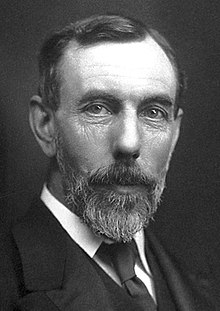
Back William Ramsay Afrikaans وليام رامزي Arabic سير ويليام رامزي ARY وليام رامزى ARZ Vilyam Ramzay Azerbaijani ویلیام رمزی AZB William Ramsay BAN Уільям Рамзай Byelorussian Уилям Рамзи Bulgarian উইলিয়াম র্যামজি Bengali/Bangla
William Ramsay | |
|---|---|
 Ramsay in 1904 | |
| Born | 2 October 1852 Glasgow, Scotland |
| Died | 23 July 1916 (aged 63) High Wycombe, England |
| Nationality | British |
| Alma mater | University of Glasgow (1866–69) Anderson's University, now University of Strathclyde Glasgow (1869)[1] University of Tübingen (PhD 1873) |
| Known for | Discovering noble gases Ramsay grease |
| Awards | Leconte Prize (1895) Barnard Medal for Meritorious Service to Science (1895) Davy Medal (1895) Longstaff Prize (1897) Nobel Prize in Chemistry (1904) Matteucci Medal (1907) Elliott Cresson Medal (1913) |
| Scientific career | |
| Fields | Chemistry |
| Institutions | University of Glasgow (1874–80) University College, Bristol (1880–87) University College London (1887–1913) |
| Doctoral advisor | Wilhelm Rudolph Fittig |
| Doctoral students | Edward Charles Cyril Baly James Johnston Dobbie Jaroslav Heyrovský |
Sir William Ramsay KCB FRS FRSE (/ˈræmzi/; 2 October 1852 – 23 July 1916) was a Scottish chemist. Ramsay discovered the noble gases. He also helped discover several elements that are on our periodic table today. He received the Nobel Prize in Chemistry in 1904 "in recognition of his services in the discovery of the inert gaseous elements in air" (along with Lord Rayleigh).
Between 1894 and 1898, he discovered five new elements.[2] These were the noble gases, helium, neon, argon, krypton, and xenon.[2] Following these discoveries, Ramsay helped create the noble gases as a new group in the periodic table.[3]
- ↑ Thorburn Burns, D. (2011). "Robert Rattray Tatlock (1837–1934), Public Analyst for Glasgow" (PDF). Journal of the Association of Public Analysts. 39: 38–43. Archived (PDF) from the original on 2012-03-03. Retrieved 25 November 2011.
- ↑ 2.0 2.1 "Sir William Ramsay and the noble gases". NIH. Retrieved 3 October 2024.
- ↑ "William Ramsay". Science History. Retrieved October 3, 2024.